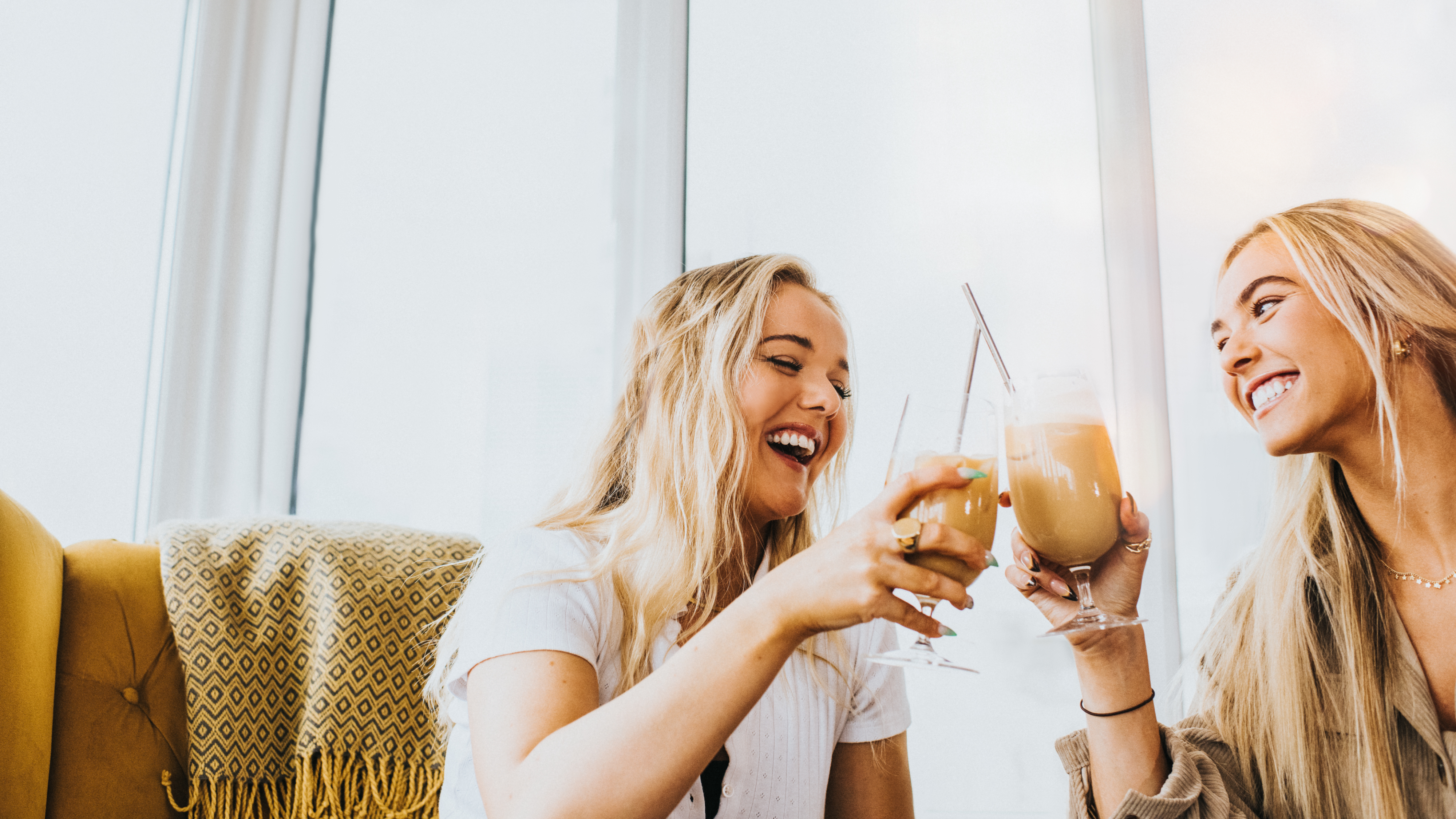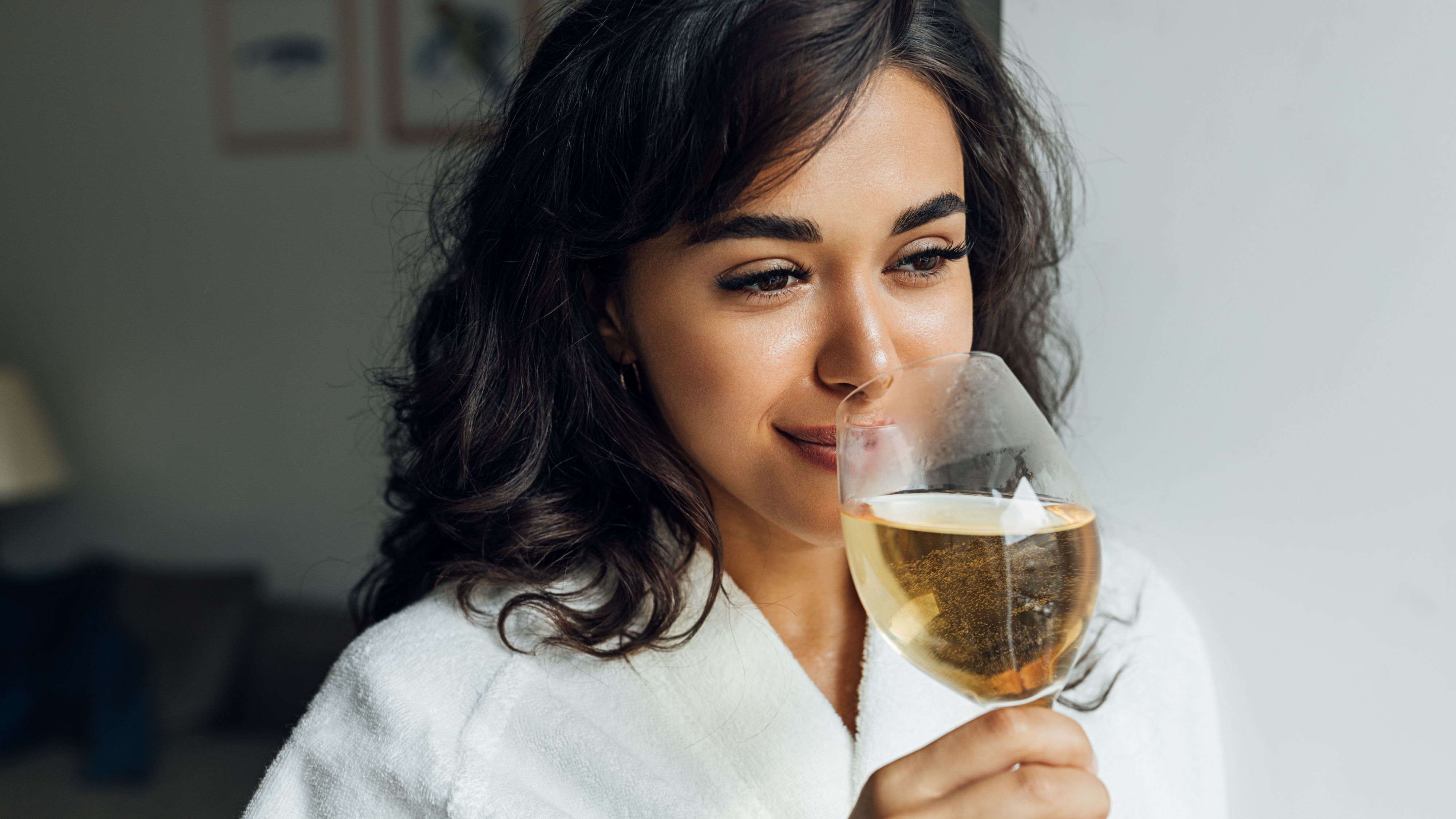How to stop drinking alcohol, for glowy skin and a better mood
Take a shot at these methods for how to stop drinking alcohol and watch the benefits flow in...

Between slipping into the habit of pouring yourself a glass—or three—of wine at home in lockdown, and a summer of ‘freedom’ cocktails, the chances are that you’ve been imbibing more booze than you’d have liked to of late.
Overindulging can serve up everything from dehydrated skin, an upset stomach, and disrupted sleep to lower mood, sexual dysfunction, and weight gain. In the long term, you're probably aware that you risk an array of serious health problems—like heart and liver diseases as well as numerous cancers. So, how to stop drinking alcohol?
Firstly, it's important to note that going cold turkey with booze can be dangerous, depending on how much you've been consuming (if it's high, it's best to speak to your doctor for guidance). But it also may be more realistic for you to gradually cut down down your levels so you can build a healthy, sustainable relationship with drinking.
With that in mind, here's the expert approach to staying off the sauce— from how to carve out alcohol-free days and tweak your routine to avoid temptation, to the beverages to swap in instead (tip: better grab one of these best reusable water bottles ahead of time), and why setting goals can keep you motivated on your sober journey...
- Benefits of not drinking alcohol: 5 reasons to say goodbye to Wine Wednesday
- Hangover myths debunked—read this before reaching for that glass of wine
- Wine hangover: this color vino will give you the worst morning after
How to stop drinking alcohol: 7 tips for getting sober

1. Know the benefits
While the odd alcoholic drink every now and again isn’t an issue, says Dr. Ross Perry, a GP and medical director of Cosmedics—but consuming booze every day, or several glasses at a time, is when it can cause a problem.
Mentally focusing on the positives of cutting back can really help with getting started. “After one week of not drinking, your sleep pattern becomes more regulated, you wake up with more energy and skin looks clearer,” points out Dr. Perry. “If you don’t drink any alcohol for a month, your liver fat reduces by up to 15%, increasing its ability to flush out toxins. By this point, you’ll also notice a flatter stomach and much clearer skin.”
And, if you stick with it, there are even more advantages to a largely teetotal life. “Giving up alcohol will strengthen your immune system and make it easier for your body to fight off infection should you get ill,” continues Dr. Perry. “Your kidneys—whose job is to sift out harmful substances, like alcohol, from the blood—will also function better."
You'll also be less dehydrated, he adds, explaining: "Booze is a diuretic, meaning it affects the kidneys and makes you pass water much more than you normally take in—once you stop drinking, and replenish the fluids, you'll notice improvements in things like sleep quality and those dull headaches will fade.”
2. Track your intake
Next, it's worth getting to the bottom of your current relationship with booze—how much are you actually sipping your way through right now? You might be surprised.
“Record the drinks you’re having—and how many units they contain—so that you have a more accurate idea of what you’re consuming,” says Dr. Don Grant, a psychologist and addiction specialist at The Independent Pharmacy. “Being more aware will help you reduce your intake."
Remember, the Centers for Disease Control and Prevention recommend that men should consume two or fewer alcoholic drinks a day, while women should have no more than one. It quickly adds up.
3. Take a break
An easy way to slimline your intake is to factor completely alcohol-free days into your schedule. “If you drink every day, start by drinking every other—and slowly reduce this down, first to every few days, then perhaps just at the weekend,” advises Dr. Perry. “It’s important, though, not to binge on the days you do allow yourself some booze.”
If the idea of swathes of sobriety sounds daunting, you can help stop yourself from falling off the bandwagon by reducing any temptations in your home environment.
“Get rid of any alcohol around the house,” says Dr. Perry. Then, he adds, be patient (and drink lots of water). After a couple of days of not drinking your body goes into detox mode, and it's then that you’ll start to feel really refreshed.

4. Change your order
For the occasions you do decide to drink, there are some tweaks you can make to keep your intake under control. “Opt for small drinks like a bottled beer instead of a pint, or choose lower-strength drinks,” suggests Dr. Grant. “You can also alternate between alcoholic drinks and soft drinks or water so that you’re more hydrated.”
And if you’re cutting down on alcohol mainly for the benefit of your skin (totally valid, by the way), what you choose to sip on can have an impact in the beauty department.
“Research has shown that, while there isn’t a specific drink that could cause harsher signs of aging, under-eye puffiness is seen more when you drink a mix of spirits, beer, and wine,” notes Dr. Lauren Hamilton, a cosmetic and wellness doctor and founder of skin clinic Victor & Garth.
However, sober is your best bet to avoid a cocktail of complexion concerns. Dr. Hamilton adds: “Studies show that drinking, in general, can cause more forehead wrinkles, under-eye puffiness, loss of volume around eyes, cheeks and lips and dilated blood vessels." While these are signs that naturally appear as we age, they are more pronounced in those who consume alcohol regularly. Not pretty!
5. Adapt your routine
If you’re serious about cutting back, it can be really helpful to replace the moments in your life when you’re most drawn to drink with other activities. For example, if you consume alcohol while watching television, try to focus on reading a book instead. Use alcohol to relieve stress? Explore alternatives like meditation, yoga, or calling a loved one.
“And avoid the pub,” insists Abbas Kanani, a pharmacist at Chemist Click. “It may sound obvious, but swapping the bar for the gym or some other kind of movement else will limit the opportunities made available to drink. Plus, exercise triggers those 'feel-good' hormones which will help you start to feel better about yourself and continue to limit booze—helping this positive cycle continue."
6. Alter your focus
If a night of drinking was something you have tended to look forward to, try and give yourself an alternative—healthier—high.
“Put a list of aims together at the beginning and note down a list of benefits that come with cutting down on booze, including better skin, better sleep quality, no headaches or feeling groggy, more energy—having it in writing really helps to act as a guide,” says Dr. Perry. “Then, set yourself a list of other goals—going to bed early to get up and exercise is a good one because it's a mood booster that will mentally set you up for the day and you’ll soon find that you just don’t fancy that glass of wine at night.”
He also suggests rechannelling the money you’ll inevitably save on booze into a "treat box" to save up for something you really want to buy—like some luxe leggings to workout in.
7. Seek professional help
Sometimes reducing your drinking can't be done solo—and that's ok.
“If you have alcohol dependence, or drink on a daily basis, you may need professional help,” says Kanani. “Speak to your pharmacist or doctor who can signpost you to the right services. Don’t be afraid of reaching out—as a healthcare professional, I have always had the utmost respect for people showing a willingness to make an improvement in their life.”
Find out more information at the Alcohol Rehab Guide and also check out the online recovery program Tempest.
Lauren is a freelance writer and editor with more than six years of digital and magazine experience. Most recently, she has been the Acting Commissioning Editor of Women's Health—where she co-produced the Going For Goal podcast—and has previously also written news and features for titles including The Telegraph, Grazia, Stylist, Dazed, The Sun's Fabulous, Yahoo Style UK and Get The Gloss. She covers all aspects of lifestyle, specializing in health, beauty, and travel. Can't live without: oat milk lattes, new podcast episodes, long walks, and great skincare.